Ukraine-Russia war: Russia blacklists 121 Australians ‘indefinitely’
Russia has banned 121 Australians – including journalists and defence force officials – from entering the country as Volodymyr Zelensky invites Anthony Albanese to Kyiv.
World
Don't miss out on the headlines from World. Followed categories will be added to My News.
Russia has announced it will blacklist 121 Australian citizens, including defence officials, businessmen and reporters and editors.
Adelaide Advertiser editor Gemma Jones, Herald Sun editor Sam Weir, The Daily Telegraph editor Ben English, and The Australian’s editor-in-chief Christopher Dore, are among those barred from entering Russia “indefinitely”, the ministry said in a statement.
The blacklist has been put together in response to “the growing sanctions of the Australian government, which apply to an increasing number of Russian citizens,” the Russian foreign ministry said.
Other people on the list include Defence Force Chief General Angus Campbell, mining magnate, Gina Rinehart, News Corp columnist Andrew Bolt, journalists Stan Grant and Liz Hayes, ABC chair Ita Buttrose, and AI researcher Toby Walsh.
Billionaire property developer Harry Triguboff also made the list along with former treasurer Peter Costello, who is now Nine Entertainment chairman.
It comes after Ukraine asked Australia for more “heavy weapons” in its fight against invading Russian forces earlier this month.
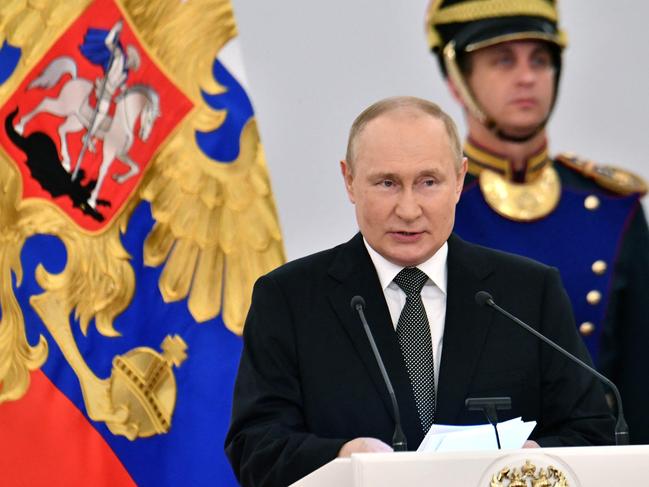
Russia has accused the sanctioned figures of promoting a “Russophobic agenda” and said that the blacklist would be expanded in the future.
In April, Moscow announced entry bans on the leaders of Australia and New Zealand in tit-for-tat measures after Canberra and Wellington imposed sanctions on Russia over its military campaign in Ukraine.
IMAGE EMERGES OF CAPTURED US FIGHTERS
An image has emerged of two US fighters who have reportedly been captured by Russian forces.
Alabama men Alexander Drueke, 39, and Andy Huynh, 27, went to Ukraine as volunteer fighters against Russian forces.
Their families are concerned they may have been captured after the pair had been missing for a week.
There are unconfirmed reports the men were taken as Russian prisoners of war.
The White House said it was “working very hard to learn more” about their whereabouts.
An image, shared on Twitter, shows the men sitting in what appears to be the back of a vehicle. They are wearing camouflage-style clothing and look to have their hands tied behind their back.
It is unclear when this photo was taken or if they men have sustained any injuries.
There are also reports of a third missing American, according to US authorities.
ZELENSKYY INVITES ALBO TO VISIT KYIV
It comes as Ukranian President Volodymyr Zelenskyy has invited Anthony Albanese to visit Kyiv in a show of solidarity.
The PM is due to attend the annual NATO summit in Madrid later this month, and is expected to stop over in France for a meeting with President Emmanuel Macron.
Ukrainian Ambassador Vasyl Myroschnychenko said he hoped to pass on the invitation to Albanese in person next week.
“I was in Kyiv last week. I picked up a letter from my President to Mr Albanese, congratulating him on his election and inviting him to come to Ukraine,” Mr Myroschnychenko told The Australian.
“I would like to have an opportunity to personally deliver it to him next week.”
Labor sources told the publication the trio may not be possible given Australia’s energy crisis.
But Mr Myroschnychenko said: “The price of petrol, gas, electricity – the reason Australian people are suffering – is because of Russia’s invasion of Ukraine, which has pushed up energy prices across the world.”
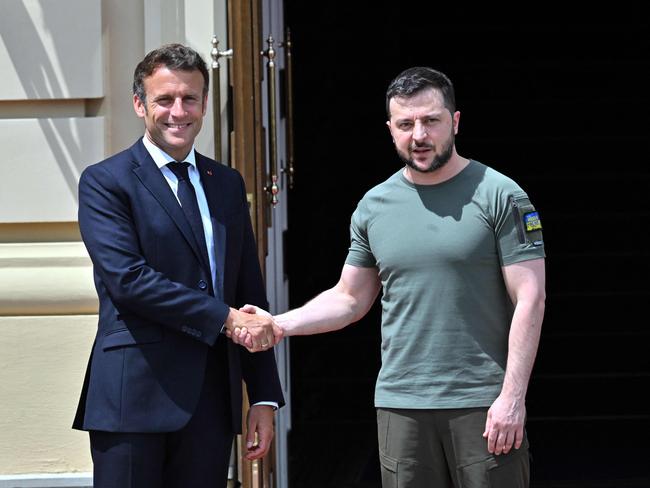
It comes as The Kremlin warned against new Western weapons supplies to Ukraine as French President Emmanuel Macron, German Chancellor Olaf Scholz and Italian Prime Minister Mario Draghi arrived in Kyiv.
“I would like to hope that the leaders of these three states and the President of Romania will not only focus on supporting Ukraine by further pumping Ukraine with weapons,” Kremlin spokesman Dmitry Peskov told reporters.
He added that it would be “absolutely useless and will cause further damage to the country”.
The leaders of the European Union’s biggest economies are making their first trip to Ukraine since Russia sent troops to Ukraine on February 24.
They are expected to hold talks with Mr Zelenskyy.
“Let’s hope they will encourage President Zelenskyy to really look at the state of affairs,” Mr Peskov said.
The trio of European leaders arrived in Ukraine by train earlier on Thursday. Romanian leader Klaus Iohannis joined them in the battle-scarred Kyiv suburb of Irpin.
The visit comes as Ukraine is pushing to be given official candidate status to join the EU.
RUSSIA CAPTURES FIRST US PRISONERS OF WAR
Two former US servicemen have been captured by Russian forces following a fierce battle outside the northeast Ukrainian city of Kharkiv.
Believed to be the first US servicemen to become prisoners of war, Alexander Drueke, 39, and Andy Huynh, 27, had been serving as volunteers with a regular Ukrainian army unit, according to The UK Daily Telegraph.
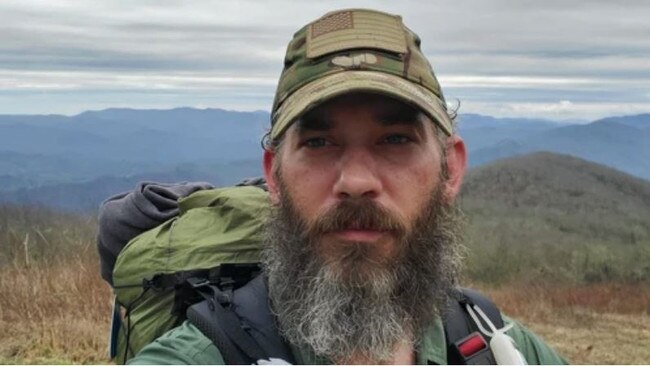
However, a growing number of Western military volunteers have also been captured by Russian forces, including three British citizens, sentenced to death after being tried as “mercenaries” in the pro-Russian breakaway state of the Donetsk People’s Republic.
Russian president Vladimir Putin is expected to demand significant concessions in exchange for their release.
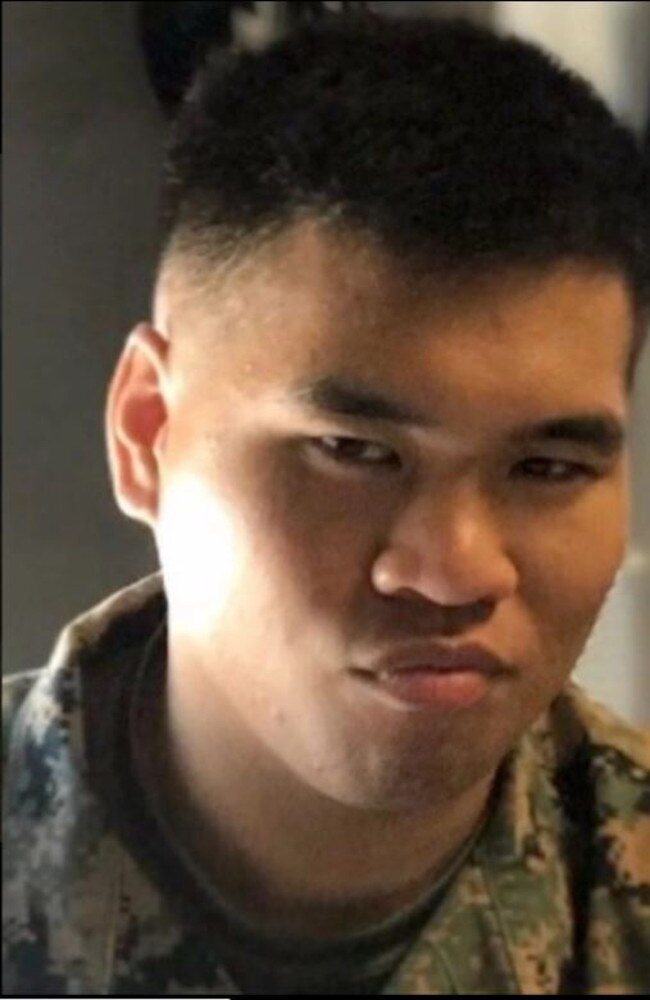
A comrade of the two men told the Telegraph the pair had been captured after running into a much larger Russian force during a battle last Thursday in the village of Izbytske, 30 miles northeast of Kharkiv, and less than eight kilometres from the Russian border.
“We were out on a mission and the whole thing went absolutely crazy, with bad intel,” he said.
“We were told the town was clear, when it turned out the Russians were already assaulting it. They came down the road with two T72 tanks and multiple BMP3s [armoured fighting vehicles] and about 100 infantry. The only thing that was there was our 10-man squad.”
He said the squad fell back and set up defensive positions, laying an antitank mine in the road for the advancing T72s, while Mr Drueke and Mr Huynh manned an RPG7 rocket-propelled grenade launcher together.
“Everybody took cover waiting for one of the tanks to hit the antitank mine, but Alex and Andy saw a BMP3 coming from another direction through the woods and realised that it would kill most of us. They opened fire and took it out with their first shot,” the man said.
Their brave actions caught the attention of one of the T72 tanks, which returned fire, reportedly missing the pair, and instead knocking them out with the blast.
“It was all very chaotic, but we suspect that they were knocked unconscious by either the blast from the tank shooting at them, or from the antitank mine blowing up, because later search missions found not a sign of them,” the comrade said.
“Afterwards, we sent drones up and had a Ukrainian search team on the ground, but we found nothing. If they had been hit by the tank shell, there would have been remains of their bodies or equipment at the scene.”
He said his suspicions grew later that night, when a message appeared on a Russian Telegram channel claiming that two American servicemen had been taken as prisoners of war near Kharkiv.
“It is too much of a coincidence for that to have happened otherwise – we are the only Americans fighting in this area,” said the comrade.
“We are not mercenaries, or part of some militia. We are serving under the command of the Ukrainian armed forces. I am speaking out on my missing comrades’ behalf because I want it in the public domain that they are missing, so that the Russian high command is made aware too.
“That hopefully reduces the chances of them being quietly executed by whoever is holding them further down the chain.”
CHINA PLEDGES ‘SUPPORT’ TO RUSSIA
Chinese President Xi Jinping has reasserted China’s support for Russia in a “warm and friendly” phone call with Vladimir Putin.
The Kremlin said Mr Xi had noted the legitimacy of actions take by Russia to protect itself “in the face of challenges to its security created by external forces”.
Both leaders reportedly agreed Sino-Russian relations were at an “unprecedentedly high level” and expressed their intentions to deepen ties in energy, finance and industry.
As Russia and China renewed their mutual support in the face of Western sanctions, US Defense Secretary Lloyd Austin has urged European allies to step up arms shipments to Ukraine.
In eastern Ukraine, troops fired a volley of shells from French-supplied Caesar howitzers towards Russian positions, even as Western ministers met at NATO headquarters in Brussels.
Britain announced that its delivery of the advanced Multiple Launch Rocket System to Ukraine was now “imminent” – but still Kyiv pleaded that it is outgunned on the frontline and in need of quicker support.
“We can’t afford to let up and we can’t lose steam. The stakes are too high. Ukraine is facing a pivotal moment on the battlefield,” Austin told a meeting of allies in Brussels on Wednesday.
“We must intensify our shared commitment to Ukraine’s self-defence, and we must push ourselves even harder to ensure that Ukraine can defend itself, its citizens and its territory.” Austin said that Moscow’s attack on its pro-Western neighbour “isn’t just a danger to Ukraine – it’s a menace to European security”.
“So we must continue to rise to meet this challenge,” he said, sitting next to Ukraine’s defence minister Oleksiy Reznikov.
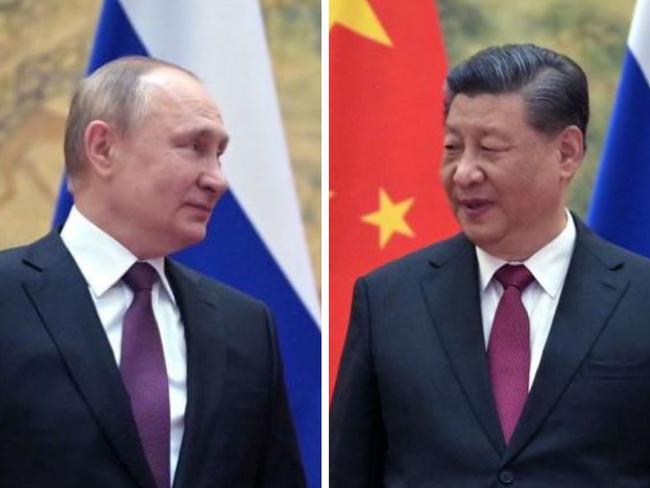
While the western allies debate how best to help Ukraine, China’s President Xi Jinping assured his Russian counterpart Vladimir Putin of Beijing’s support for Moscow.
China has refused to condemn Moscow’s invasion of Ukraine and has been accused of providing diplomatic cover for Russia by criticising Western sanctions and arms sales to Kyiv.
State media reported that China is “willing to continue to offer mutual support (to Russia) on issues concerning core interests and major concerns such as sovereignty and security”.
And the Kremlin said that, in a call, Xi and Putin had agreed to ramp up economic co-operation in the face of “unlawful” Western sanctions.
‘WE ARE WAITING FOR A DECISION’
Earlier, Ukraine had delivered a message to the meeting on behalf of its embattled troops struggling to hold back a Russian offensive.
“Brussels, we are waiting for a decision,” Mykhaylo Podolyak, senior aide to President Volodymyr Zelenskyy said, warning that Ukraine’s artillery is outgunned by 10 to one.
“Daily, I receive a message from the defenders: ‘We are holding on, just say: when to expect the weapons?’” he said.
The industrial city of Severodonetsk is under intense bombardment as Russia focuses its offensive on the Donbas region in an effort to secure a swath of eastern and southern Ukraine.
Russian missile blew up our @WCKitchen food train in Eastern Ukraine… Nobody hurt thankfully…but they are now hitting train infrastructure hard! Only 1 wagon of food fully lost, will save the rest! This won’t stop us—our amazing Ukrainian WCK teams will keep feeding the people! pic.twitter.com/cRlIdyTkXg
— José Andrés (@chefjoseandres) June 15, 2022
RUSSIA OFFERS UKRAINIANS SAFE EXIT ON ONE CONDITION
The Russian army has offered to establish a humanitarian corridor to evacuate hundreds of civilians holed up in the besieged Azot chemical plant in the Ukrainian city of Severodonetsk if they surrender.
Russia’s Defence Ministry announced that it will open the route from the plant to the city of Svatovo, occupied territory in the separatist-held region of Luhansk, on June 15.
“Guided by the principles of humanity, the Russian armed forces and the formations of the Luhansk People’s Republic are ready to organise a humanitarian operation to evacuate civilians,” the Defence Ministry said on Tuesday.
The humanitarian corridor will be in place between 8am (0500 GMT) and 8pm Moscow time Wednesday, the defence ministry said.
Moscow also urged “militants of nationalist battalions and foreign mercenaries” at the plant to “stop senseless resistance” and lay down their arms.
Authorities in Ukraine have said that there are over 500 civilians hiding inside Azot, adding that it was difficult to support them but there were some reserves inside the plant.
A representative of the separatist authorities in Luhansk, Vitaly Kiselyov, estimated that some 2,500 Ukrainian and foreign fighters could be holed up at the Azot plant.
Moscow has laid siege for weeks to the cities of Severodonetsk and Lysychansk, the last areas in the eastern Ukrainian region of Luhansk still under Kyiv control.
The Russian army said that Ukrainian authorities requested that civilians from the Azot plant be transported to Kyiv-controlled Lysychansk but said that the evacuation there was not possible because the last bridge linking the cities had been destroyed.
‘TORTURED CIVILIANS’: HORRIFIC FIND IN MASS GRAVE
Another seven bodies, several with their hands and legs tied, have been found in a grave near Bucha, Ukraine, the regional police said Monday.
“Seven civilians were tortured by the Russians then executed in a cowardly manner with a bullet to the head,” Kyiv regional police chief Andriy Nebytov said on Facebook, saying “several victims had their hands tied and knees bound”.
“This grave was discovered today in an area where Russian troops were stationed near the village of Myrotske” which lies some 10 km northwest of Bucha, he said.
He said police were “working to identify the victims”.
Bucha made global headlines in early April when dozens of bodies in civilian clothing were found there, some with their hands tied, after Russian troops pulled out of the area following a month-long occupation.
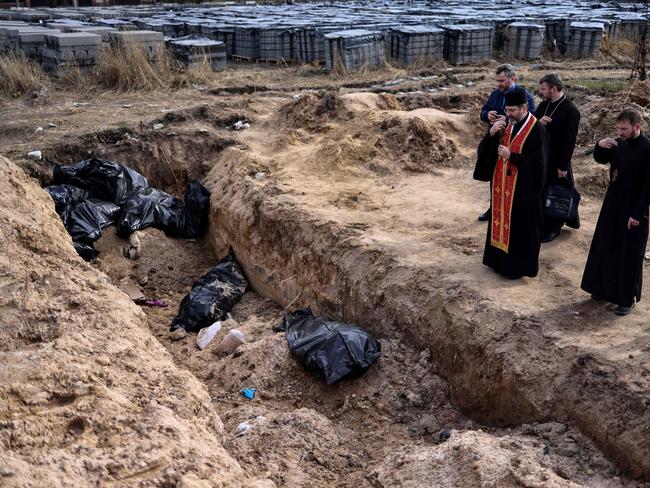
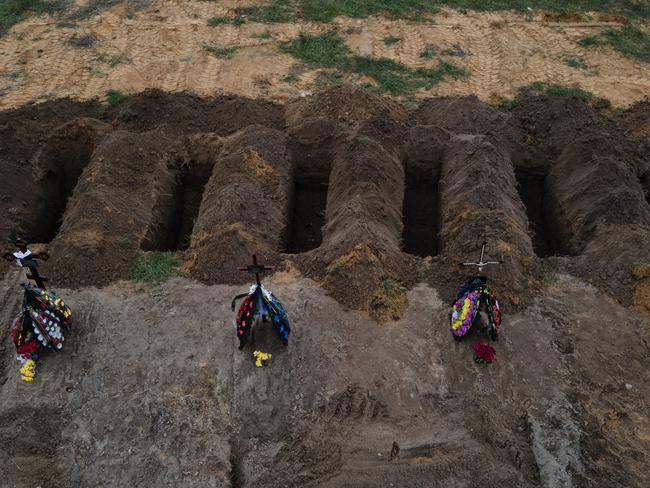
Since then, more and more corpses have been discovered in and around the area, which has become synonymous with allegations of Russian war crimes.
Moscow has repeatedly rejected such claims, insisting they were “falsifications” orchestrated by Kyiv with the support of the West.
At the end of April, the bodies of another three men with their hands bound, bearing signs of torture who had been shot dead, were found in a grave in Myrotske, police said.
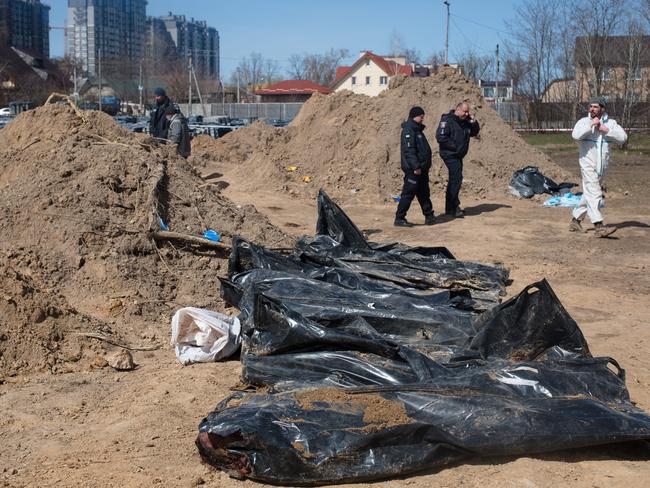
RUSSIAN ANTI-TORTURE GROUP DISBANDED
A Russian non-governmental organisation fighting for investigations into allegations of torture has disbanded after it was branded a “foreign agent” by authorities.
Founded in 2000, the Committee for the Prevention of Torture campaigned to compel Russian authorities to investigate mistreatment by security services and to take steps to stop it. The organisation’s work included the situation in Chechnya.
“We don’t want to continue working by being labelled ‘foreign agents’. We consider this term an insult and slander,” the committee’s chairman Sergei Babinets said on Sunday.
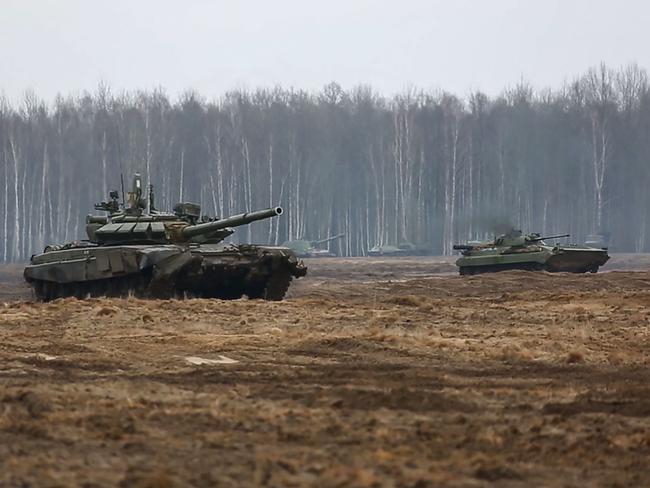
The dissolution of the organisation was decided by members on Saturday, Mr Babinets said on Telegram.
“Despite the obvious importance of our mission, the authorities have been trying for many years to portray it as foreign and harmful,” he said.
“The authorities are sending a signal that torture is becoming (or has already become) a part of government policy.”
Already branded a “foreign agent” in 2015 and again in 2016 by Russian authorities, the committee decided to dissolve itself rather than change its work in order to shake off the designation.
Russia’s first law on foreign agents was adopted in 2012. It has since been expanded to include non-profit organisations (NGOs), media outlets, and individual Russian citizens including journalists and activists.
The label “foreign agent”, reminiscent of the Soviet-era “enemy of the people”, is used by the Kremlin against non-governmental organisations, the political opposition, and journalists who are accused of carrying out foreign-funded political activities.
Those deemed to be foreign agents are subject to numerous constraints and tedious procedures, or they face heavy penalties. Those with the label must indicate their status with disclaimers in all publications.
The Committee for the Prevention of Torture’s dissolution comes amid a merciless crackdown on critical voices in Russia, particularly since the launch of the military intervention in Ukraine in late February.
Since then, many NGOs have been banned.
In April, Russian authorities shut down the offices of Amnesty International and Human Rights Watch.
RUSSIA STRIKES UKRAINE ARMS DEPOT
Russian forces said on Sunday, local time, they had struck a site in western Ukraine storing large amounts of weapons supplied by the United States and European countries, as the battle intensified for the key eastern city of Severodonetsk.
The strike on the town of Chortkiv, a rare attack by Russia in the relatively calm west of Ukraine, left 22 people injured, the regional governor said.
Meanwhile the situation in Severodonetsk was “extremely difficult”, after the Russian army destroyed a second bridge into the city and was heavily bombarding the last one, regional governor Sergiy Gaiday said.
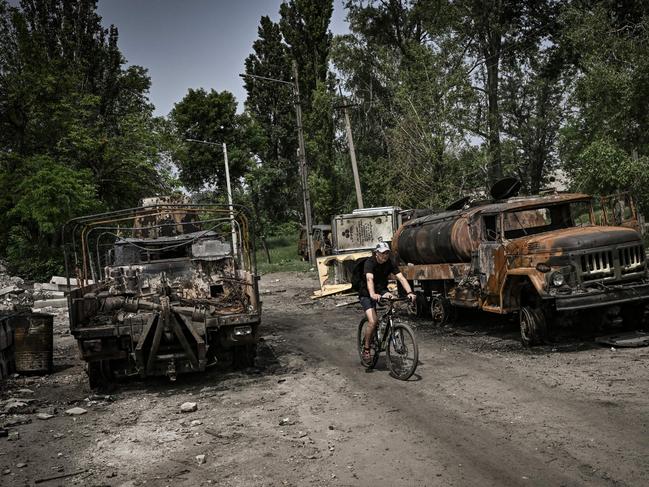
The United States and EU have sent weapons and cash to help Ukraine fend off the Russian advance, alongside punishing Moscow with unprecedented economic sanctions.
Russia’s defence ministry said the strike on Chortkiv destroyed a “large depot of antitank missile systems, portable air defence systems and shells provided to the Kyiv regime by the US and European countries”.
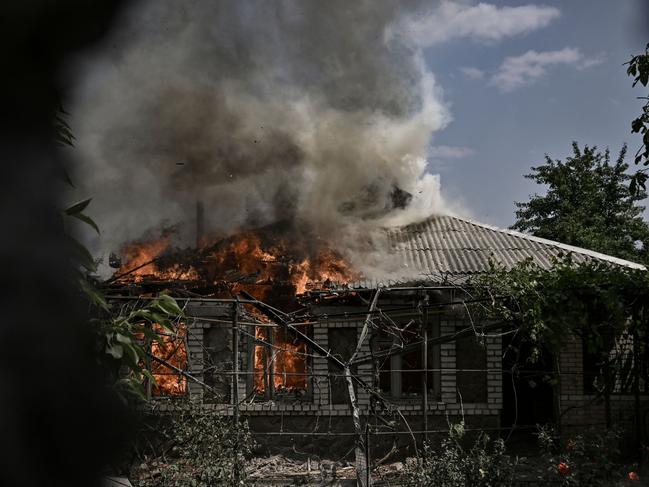
Regional governor Volodymyr Trush said that four missiles fired from the Black Sea had partially destroyed a military installation in the town, about 140 kilometres from the border with Romania, on Saturday evening.
Residential buildings were also damaged and 22 people were hurt, all of them – including seven women and a 12-year-old – taken to hospital, he said in a Facebook post.
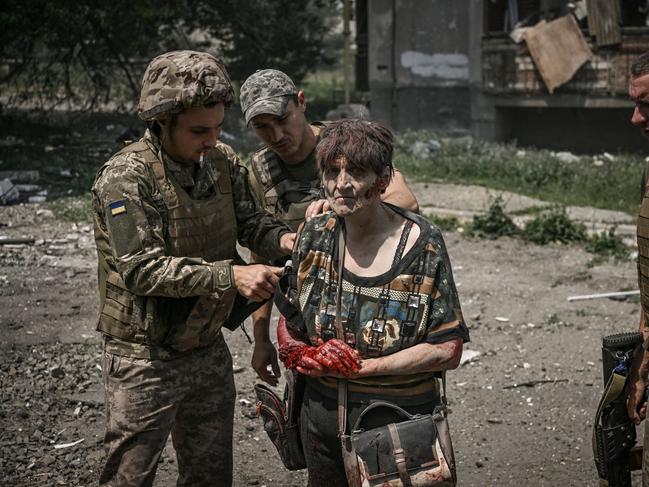
It was a rare attack in western Ukraine, with the east and south of the country having borne the brunt of Russian firepower.
The cities of Severodonetsk and Lysychansk, which are separated by a river, have been targeted for weeks as the last areas still under Ukrainian control in the region of Luhansk.
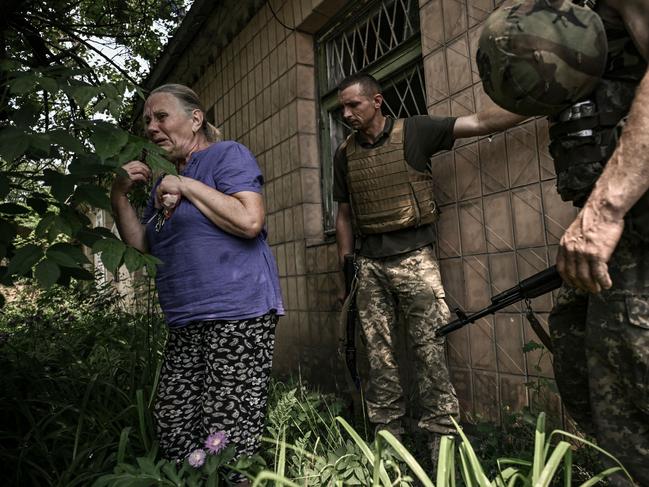
“The situation in Severodonetsk is extremely difficult,” said Luhansk governor Gaiday on Sunday, adding that by attacking the bridges, Russian forces wanted to cut off the city completely.
“Most likely, today or tomorrow, they will throw all reserves to capture the city and also possibly in other directions to cut and fully control the road” southwest to Bakhmut.
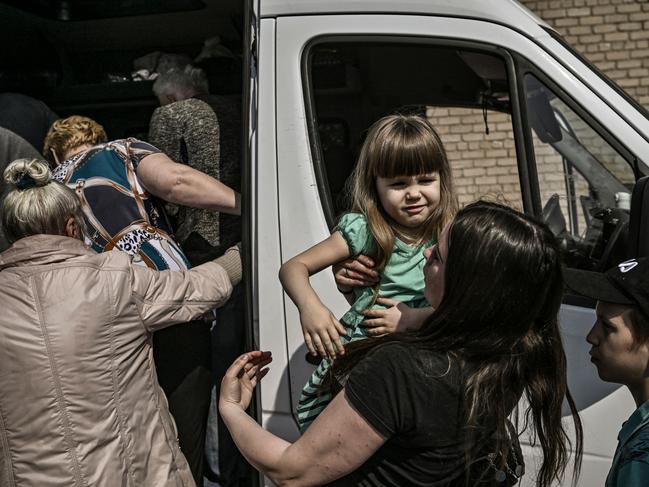
He said the Azot chemical plant was being shelled, with fighting around the area.
About 800 civilians have taken refuge in the plant’s bunkers, according to the tycoon whose company owns the facility.
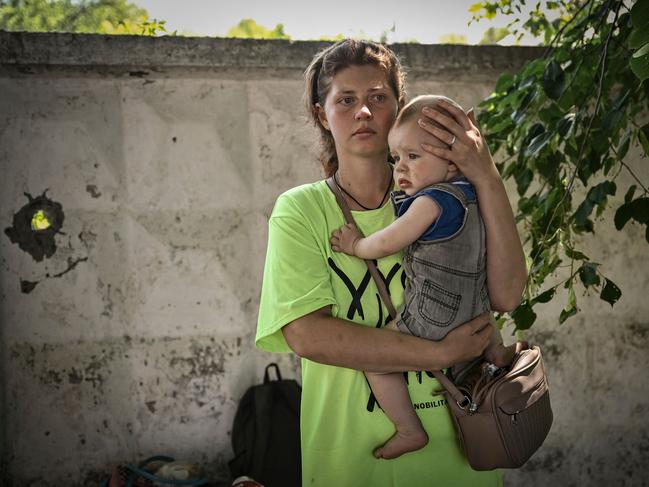
TYCOON SHELTERING HUNDREDS OF UKRAINIANS
Sanctioned by Ukraine in the past over his close ties to Russia, Dmytro Firtash, one of the country’s wealthiest citizens, made international headlines this week for saying he is sheltering hundreds of Ukrainians in his chemical factory.
“This war is completely pointless and cannot be justified in any way, it only brings suffering and misery on all sides. This humanitarian tragedy is intolerable,” the 57-year-old said in a statement on his company’s website.
A one-time ally of ousted pro-Russian Ukrainian president Viktor Yanukovych, Firtash, who is currently in Austria and fighting extradition to the US on bribery accusations, has a controversial history.
In June 2021, Ukraine President Volodymyr Zelenskyy signed a decree imposing sanctions on Firtash, including the freezing of his assets and withdrawal of licences from his companies, after accusing him of selling titanium products to Russian military companies.
But now some 800 civilians, including 200 factory workers, have taken refuge in the bunkers of the Azot chemical plant, owned by Firtash’s Group DF, in Ukraine’s strategic eastern city of Severodonetsk, the tycoon’s lawyer Lanny Davis said this week.
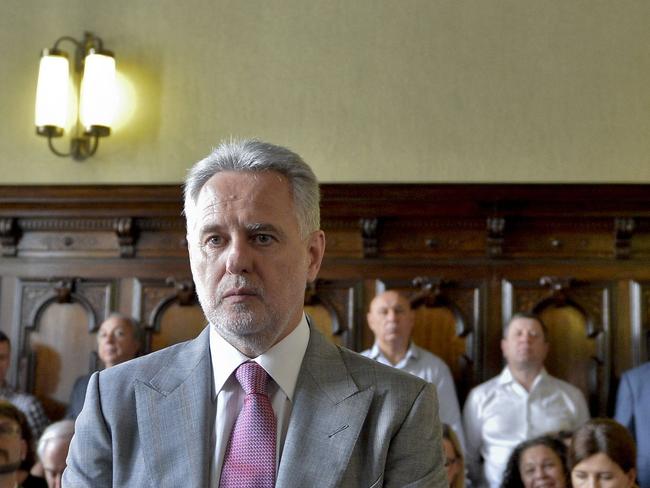
Russian troops have been pushing for control of the key city over the past weeks as part of their effort to conquer eastern Ukraine.
Russian President Vladimir Putin “is never going to come out victorious … No matter what happens, Russia will lose,” Firtash said in an NBC News interview in April.
Since Russia invaded Ukraine in February, Firtash’s Inter has also joined the pool of several main Ukrainian news channels, which broadcast news 24/7 and fully reflect the official position of the Ukrainian authorities.
Before the invasion, Inter, one of the largest Ukrainian national TV channels, was considered pro-Russian.
Firtash insists he has always been pro-Ukrainian, telling NBC that he was “never pro-Russian”.
“But you have to understand that I am a businessman. And my goal is to earn money. That’s my job,” he said in the interview.
An AFP request to interview Firtash is pending.
Firtash is also wanted on bribery and racketeering charges in the United States.
In the case, Indian officials allegedly received $18.5 million in bribes to secure titanium mining licences in 2006.
The United States argues it has jurisdiction because the conspiracy involved using US financial institutions, travel to and from the US, and use of US-based communications — computers, telephones, and the internet.
Firtash, who denies the charges and says he is the victim of a smear campaign, was detained in Austria in March 2014.
He had to pay bail of 125 million euros ($130 million) – reportedly a record high for Austria – and has since not been able to leave the country.
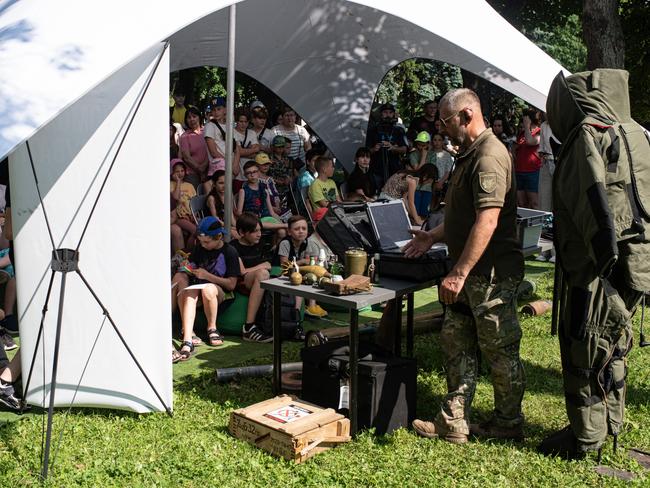
Austria’s supreme court ruled in 2019 that he could be extradited. But Firtash is still fighting the extradition and can remain in Austria while court proceedings continue.
In an interview with CNN in May, Firtash said he had requested prosecutors to be allowed to return to Ukraine while the war is going on — but his request was denied.
He has also been accused of being involved in alleged efforts by Rudy Giuliani, former New York mayor and a personal lawyer of former US president Donald Trump, to dig up dirt on Joe Biden before he became president, but Firtash denies ever having met with Giuliani.
Born in a village in western Ukraine, Firtash’s father was a diver and his mother an accountant, and for additional income the family grew tomatoes.
Firtash began his business career by organising commodity trading in Ukraine and Russia.
In 1993, he established business ties in Central Asia and organised the supply of consumer goods in exchange for natural gas.
In 2004, he set up a joint venture with Russia’s Gazprom to supply natural gas from Central Asia to Ukraine and other European countries.
Three years later, Firtash set up Group DF, growing it into a business empire, employing some 100,000 people.
The group is involved in energy, chemicals, media, banking and property in Ukraine and other countries.
ZELENSKYY ’DIDN’T WANT TO HEAR’ WARNINGS
Ukrainian President Volodymyr Zelenskyy “didn’t want to hear” US intelligence warnings before Russia’s invasion of Ukraine.
Mr Biden made his remarks during a Democratic fundraiser in Los Angeles as Ukraine, Ukrainian war continues into its fourth month.
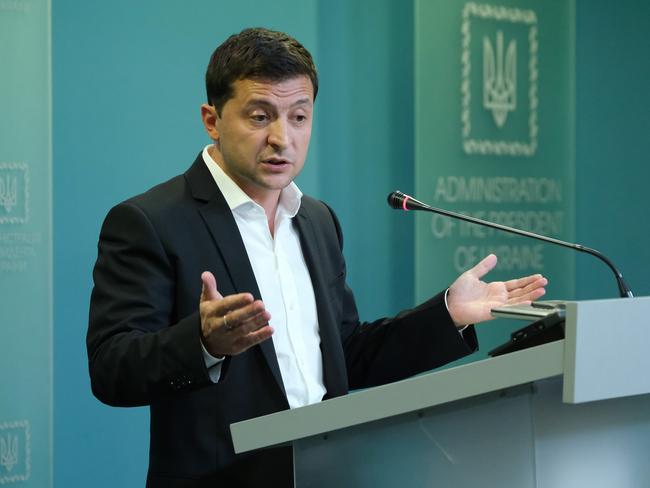
“Nothing like this has happened since World War II. I know a lot of people thought I was maybe exaggerating. But I knew we had data to sustain he [Russian President Vladimir Putin] was going to go in, off the border.”
“There was no doubt,” Mr Biden said.
“And Zelenskyy didn’t want to hear it.”
Although Mr Zelenskyy has inspired people with his leadership during the war, his preparation for the invasion has remained a controversial issue.
In the weeks before the war began on February 24, Mr Zelenskyy was annoyed when Mr Biden administration officials repeatedly warned that a Russian invasion was highly likely.
He was also concerned that the drumbeat of war was unsettling Ukraine’s fragile economy.
UK PM ‘APPALLED’ BY FIGHTERS’ DEATH SENTENCES
Prime Minister Boris Johnson is “appalled” at death sentences handed to two British fighters captured by Russian troops in Ukraine, Downing Street said Friday as London pressed the case with Kyiv.
Foreign Secretary Liz Truss spoke by phone with her Ukrainian counterpart Dmytro Kuleba, and tweeted that the sentences were an “egregious breach of the Geneva Convention”.
The “supreme court of the Donetsk People’s Republic,” one of two self-proclaimed stateless in eastern Ukraine, ordered the death penalty for Aiden Aslin, 28, Shaun Pinner, 48, and Moroccan Saaudun Brahim after the three were accused of acting as mercenaries for Ukraine.

Russia’s Interfax news agency said Thursday that the two UK citizens surrendered in April in Mariupol, a port city in southern Ukraine that was captured by Russian troops after a weeks-long siege.
“The prime minister was appalled at the sentencing of these men,” Mr Johnson’s spokesman told reporters.
“We are clear that we are supporting Ukraine in its efforts to get these men released. It is clear they were Ukrainian armed forces members and are therefore prisoners of war,” he said.
Both the Britons have been living in Ukraine since 2018 and signed up to fight when Russia invaded, according to UK media. Pinner is married to a Ukrainian woman, and Aslin is engaged to a local.

“They are not, and never were, mercenaries,” Aslin’s family said in a statement. “We hope that this sentence will be overturned and beseech the governments of the UK and Ukraine to do everything in their power to have them returned to us safely, and soon.”
In April, the two Britons were shown on Russian state TV, demanding Johnson negotiate their release. Pinner’s Conservative MP Robert Jenrick demanded the Russian ambassador in London be summoned.
But the government is reluctant to engage bilaterally with Moscow, fearing that would reinforce the claim that the captured fighters were mercenaries.
During a trial that lasted three days, the men pleaded guilty to committing “actions aimed at seizing power and overthrowing the constitutional order of the Donetsk People’s Republic”, Interfax said.

ZELENSKYY’S DESPERATE PLEA TO EU
Ukraine’s president on Friday appealed for his country not to be left in a “grey zone” with its EU membership bid, ahead of a summit set to decide on its candidacy.
“The first thing is to finally remove this grey zone,” Volodymyr Zelensky said, addressing the 2022 Copenhagen Democracy Summit by video-link.
“In the coming weeks, the European Union could take a historic step that will prove that the words on the membership of the Ukrainian people in the European family are not in vain,” he added.
The European Commission is expected to give its opinion on the issue in the coming days, before EU leaders decide whether to grant Ukraine official candidate status at a European Council summit on June 23-24.
Zelensky said he wondered why some member states were still hesitant about allowing Ukraine to join and cutting ties with Russia.
“Why, if the polls show that 71 per cent of Europeans consider Ukraine as part of the European family, are there still political sceptics who hesitate to allow us to join the European Union?” he asked.
The 27 are divided on the issue of Ukraine’s application to the alliance. While many countries, mainly in Eastern Europe, support Ukraine’s membership, some, such as the Netherlands and Denmark, are concerned that Ukraine is not ready.
KYIV TOY FACTORY BACK IN BUSINESS
Sweet-smelling wood chips are layering the factory floor again at the toy manufacturer where Robert Milayev works now that production has restarted after the withdrawal of Russian troops.
Thanks to donations, the factory outside Kyiv is back making wooden toys following a three-month hiatus that started when fighting with Moscow’s army left the factory damaged.
“When the electricity came back on and the sound of the machines came back, we were crazy with joy,” says Milayev, the chief engineer.
Like the rest of the village of Gorenka, the Ugears factory still bears the scars of Russia’s invasion. Windows at the factory are still being replaced.
On May 18, after Russian troops pulled back, employees put on overalls again and production of laser-cut models from birch, alder and poplar has been running at full speed ever since.
“Before the war, the wood came from Belarus, but now we buy it mainly from Ukraine,” says CEO Oleksiy Lysianyi, referring to his country’s northern neighbour which hosts Russian forces.
No employees were hurt when fighting was raging around the factory and Russian forces were still trying to advance towards Kyiv. Storage units at a separate location that was occupied by Russian troops were lost.
“When we say we deliver to China, people are surprised because we usually buy from there,” says Lysianyi.
Manager of the packaging line Iryna Denysyuk says she is “very proud” to continue the work even during war.
As the wartime economy obliges, nothing is wasted. Leftover wood from the laser-cut plates are given to a company that uses them as fuel.
More Coverage
Originally published as Ukraine-Russia war: Russia blacklists 121 Australians ‘indefinitely’




